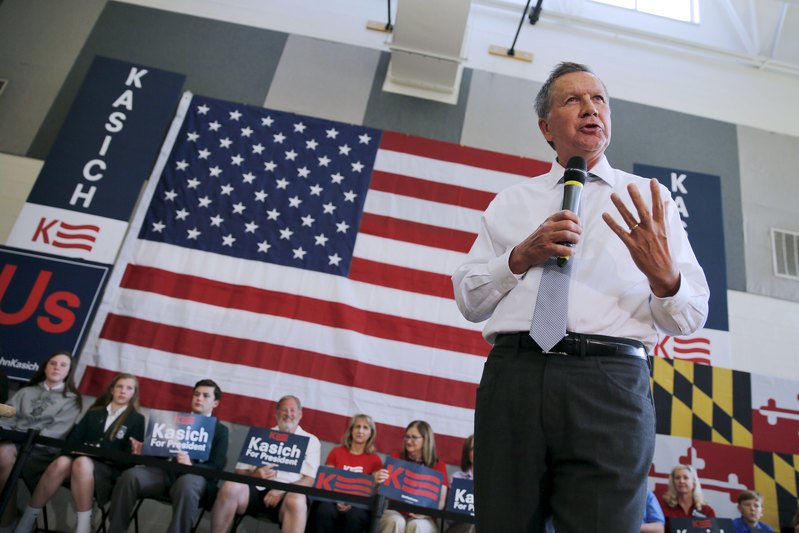On Election Eve For Five States, Trump Rips Cruz And Kasich


Republican U.S. presidential candidate John Kasich speaks at a town hall meeting at Thomas Farms Community Center, in Rockville, Maryland, U.S., April 25, 2016. REUTERS/Carlos Barria
Republican Donald Trump, on the eve of primary elections in five states that he is expected to sweep, launched blistering attacks on Monday on rivals Ted Cruz and John Kasich for their 11th-hour joint effort aimed at denying him the party’s presidential nomination.
The Cruz-Kasich agreement, which some stop-Trump Republican strategists say should have been undertaken weeks ago, was forged to try and keep Trump from securing the 1,237 delegates he needs to win the nomination outright and force Republicans to consider the two rivals at the party’s national convention in Cleveland in July.
Kasich, the Ohio governor, and Cruz, a U.S. senator from Texas, agreed not to compete against each other in three upcoming nominating contests that could prove to be pivotal: Indiana, Oregon and New Mexico.
Trump, speaking at Pennsylvania’s West Chester University, near Philadelphia, dismissed the deal as a sign of desperation and predicted he still would win the nomination on the convention’s first ballot.
With dramatic flair, he compared his plight to a champion boxer whom Trump said he once warned not to go into unfriendly territory because the judges could rule against him.
The boxer, Trump said, replied: “If I knock him out there’s not a damn thing the judges can do.”
Trump is expected to win all five of Tuesday’s nominating contests in the northeastern states of Pennsylvania, Connecticut, Rhode Island, Delaware and Maryland, which have a total of 172 delegates at stake.
Trump is already ahead in the delegate race with 845, followed by Cruz with 559 and Kasich with 147, according to the Associated Press.
After Tuesday, Indiana, which votes on May 3, will be the next big battleground, with 57 delegates up for grabs.
The Kasich-Cruz deal already showed signs of bending on Monday, with Kasich telling voters in Philadelphia that people who want to vote for him in Indiana should still do so.
“I’ve never told them not to vote for me, they ought to vote for me. But I’m not over there campaigning and spending resources,” he said.
Cruz took steps to maintain he is a serious contender for the nomination with his campaign team announcing he has developed a short list of vice presidential running mates. Traditionally, candidates wait until they have secured the nomination to select a running mate.
One person being vetted for the No. 2 position is former Republican presidential candidate Carly Fiorina, an aide to Fiorina said. Fiorina, a businesswoman, endorsed Cruz when she dropped out of the race.
AGREEMENT SIGNALS PANIC
Showing no sign of trying to unify Republicans around him with a more serious demeanor, Trump ripped Kasich for refusing to get out of the race and even criticized his eating habits.
“This is just a guy who’s a stubborn guy, who eats like a slob and shouldn’t have press conferences while he’s stuffing stuff down his throat,” Trump said.
On Cruz, Trump said he has done a “lousy job” in the Senate and has shown that he “cannot build consensus.”
Trump agreed to an May 17 interview with Fox News anchor Megyn Kelly, whose questioning of him at a debate last August angered Trump and led him to criticize her for months.
Cruz said the deal with Kasich was aimed at preventing a Trump nomination that he argues would assure victory for Democrat Hillary Clinton in the Nov. 8 presidential election.
The Cruz-Kasich agreement is unique in modern presidential politics and signaled panic after Trump’s sweeping victory in last week’s New York primary, said Larry Sabato, director of the University of Virginia’s Center for Politics.
“They know he’s going to have a great night tomorrow,” Sabato said. “If things are not shaken up, Trump’s going to be the nominee. They have to do something big to shake things up. They’re hoping that this is it.”
But Cruz said Trump was the desperate one because he knows he has a difficult path to win the party’s nomination.
“I don’t doubt that Donald Trump is going to scream and yell and curse and insult and probably cry and whine some as well,” Cruz said in Indiana. “That has been Donald’s pattern.”
Trump has dominated the nominating contests so far but still faces a tough path to earn the delegates needed to lock up the nomination before the convention.
If no candidate has enough delegate support on the first vote at the national convention, many delegates can switch to another candidate on subsequent ballots.
Политика конфиденциальности | Правила пользования сайтом







